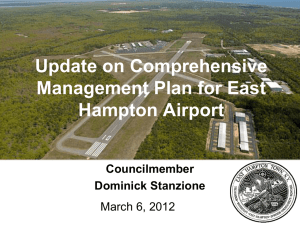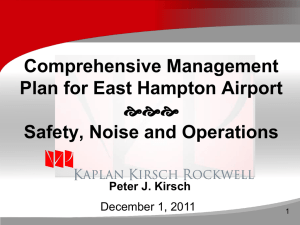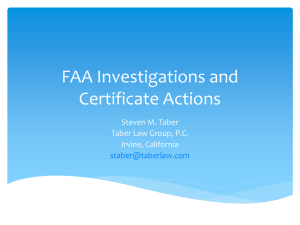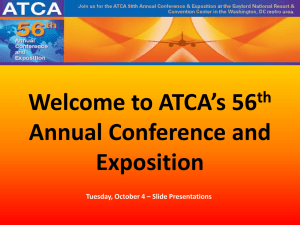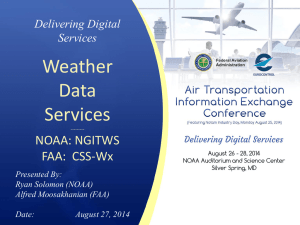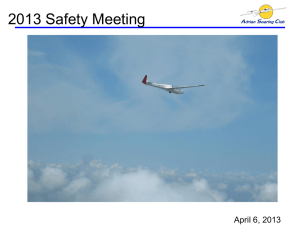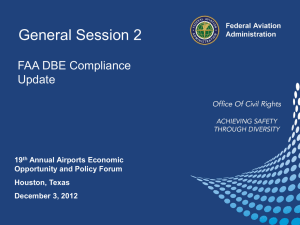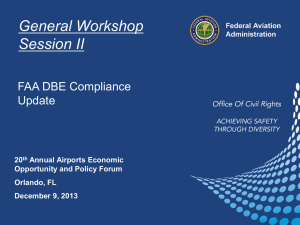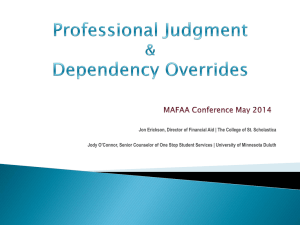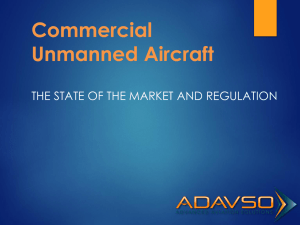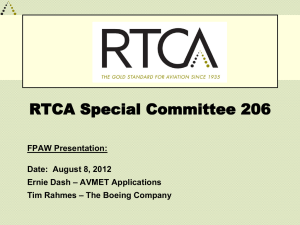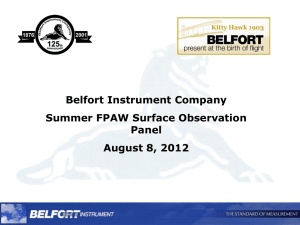docs\Town Documents\120417 April 2012 Comprehensive Plan
advertisement
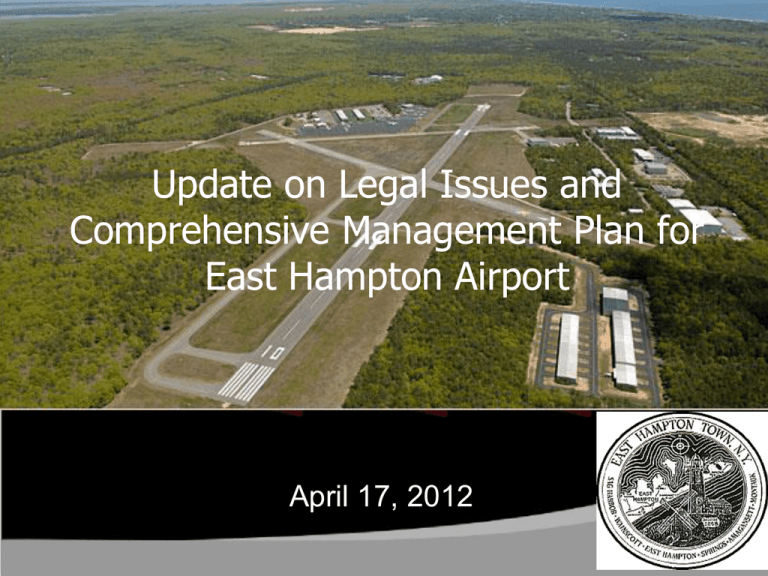
Update on Legal Issues and Comprehensive Management Plan for East Hampton Airport April 17, 2012 Today’s Presentation Staff and consultant work since December Recent FAA legal memo to Congressman Bishop Next steps Comprehensive management approach Noise Safety Operations Finances Airport team TEAM MEMBER RESPONSIBILITY Supervisor Wilkinson, Councilmember Stanzione Airport staff, Town staff and Town attorney DY Consultants and subconsultant (HMMH) Policy oversight Kaplan Kirsch & Rockwell Gilmartin & Bregman Federal law and FAA liaison Article 78 litigation Robinson Aviation Air Traffic Control Tower Airport management, oversight Engineering, design, noise planning, analysis, and implementation assistance 2010-11: Solid foundation for prudent management Master plan completed and approved ALP submitted and conditionally approved Reestablished cooperative relationship with FAA Led regional effort to address helicopter routes from NYC Approved funding for seasonal control tower Hired engineer to develop plan for tower Negotiated with FAA over airspace Presented outline of comprehensive plan December 2011 – April 2012 Held public hearing and unanimously approved grant application for perimeter fence design Prepared site design and planning documents for air traffic control tower Negotiated contract for operation of tower with Robinson Aviation Coordinated with FAA for tower operations Continued coordination with Congressional delegation on airport safety, tower, and helicopter routes (both North and South Shore routes) December 2011 – April 2012 Met repeatedly with senior FAA officials to improve coordination on airport safety, finance and tower Worked with FAA on designation of offshore helicopter routes for summer 2012 Defended miscellaneous Article 78 challenges in state court Prepared for summer 2012 season Addressed airport staffing needs December 2011 – April 2012 Began initial data collection program for Part 161 study – Vector (improved collection of operational data and landing fees) PlaneNoise (improved complaint tracking and reporting) AirScene (improved flight track, altitude, and flight identification data access and storage) Legal issues - update Would taking FAA grants affect the Town’s legal ability to -Ensure safety of airport facilities Preserve local control over airport operations? Implement the noise control elements of the comprehensive management plan? Fund airport operations and maintenance without resort to local tax funds? Background - Principles of grant funding • National airport system is operated by local governments • Airport operations are supposed to be funded by airport users • Recognizing that fees from operations might not be sufficient to fund essential capital needs and maintenance, Congress created federal grant program for airports. • For obvious reasons, most of the 3400 grant-eligible airports take federal grants (almost 20,000 airports in the country) – Significant dollars – Considerable benefit for local taxpayers FAA- Cong. Bishop Correspondence • Bishop asked FAA in Dec. 2011 to clarify eight questions regarding FAA role, federal law • FAA undated response provided to us in late February • FAA affirmed legal advice that the Town has received FAA clarifications – the legal standard “It is well settled that [the Town has] limited proprietary authority to restrict access to control noise. Whether or not they have accepted grants from the FAA, they are vested only with the power to promulgate reasonable, nonarbitrary, and nondiscriminatory regulations that establish acceptable noise levels for the airport and its immediate environs. Any other conduct . . .would frustrate the statutory scheme and unconstitutionally burden the commerce Congress sought to foster.” FAA clarifications – effect of grant assurances “From a legal perspective, airport operators have limited proprietary authority to restrict access as a means of reducing aircraft noise impacts in order to improve compatibility with the local community. This limitation applies to the same degree whether or not the airport operator has accepted grants of Federal funding from the FAA.” FAA clarifications – applicability of 161 “The FAA’s agreement not to enforce also means that unless the town wishes to remain eligible to receive future grants of Federal funding, it is not required to comply with the requirements under the Airport Noise and Capacity Act of 1990 (ANCA), as implemented by title 14 CFR, part 161, in proposing new airport noise and access restrictions.” FAA clarifications – effect of Part 161 • ANCA and Part 161 require FAA approval for restrictions that affect stage 3 jets. • No FAA approval needed for restrictions that affect stage 1, stage 2 or helicopter operations. • Part 161 uses the same constitutional standard for judging the permissibility of restrictions. FAA clarifications - litigation “The issue in any court proceeding, whether brought by private parties or the United States, would be the same: whether the noise restriction adopted by the town is reasonable, nondiscriminatory, and justified. The assurances, which reflect limitations in applicable Federal and constitutional law, do not ‘allow the FAA to substitute its view of the need for noise restrictions for that of the town as proprietor.’” FAA clarifications –helicopter restrictions If Town is grant obligated If no grant obligations Collect data on need for restriction Required Required Design restriction carefully tailored to need Required Required Prepare study justifying restriction Required Required Demonstrate that restriction is reasonable, nondiscriminatory and nonarbitrary Required Required Notice and opportunity for public comment Required Optional FAA review Optional Optional FAA approval No No Litigation exposure – administrative suit by FAA Possible No Litigation exposure – suit in federal court by FAA Possible Possible Litigation exposure – suit by private party Possible Possible Practical effect of grant obligations on Town Grant obligated No grant obligations Comply with Part 161 Yes No FAA approval required for helicopter restrictions No No Any restriction must be reasonable, nonaribtrary and nondiscriminatory Yes Yes Automatically eligible for federal grants of $150,000 per year Yes No Eligible to apply for additional FAA grants Yes No Lawsuit possible if restriction denies access on fair and reasonable grounds Yes Yes Potential parties to litigation FAA, private parties FAA, private parties Forum for litigation by FAA (1) FAA (2) federal court Federal court Forum for litigation by others Federal court Federal court Conclusion – FAA clarifications • Comprehensive management plan takes all of these factors into consideration. • The FAA opinion memo issued to Cong. Bishop does not change our legal advice, our proposed strategy or the recommended measures to address comprehensive airport management. • In short, FAA grants will not adversely affect Town’s ability to address community noise concerns. Next steps Forthcoming – Spring/Summer 2012 SEQRA documentation and public hearing on perimeter fence construction Application for FAA funding for perimeter fence construction Public hearing and submission of airport CIP Refine list of noise management options Open air traffic control tower Continue data collection Questions?
